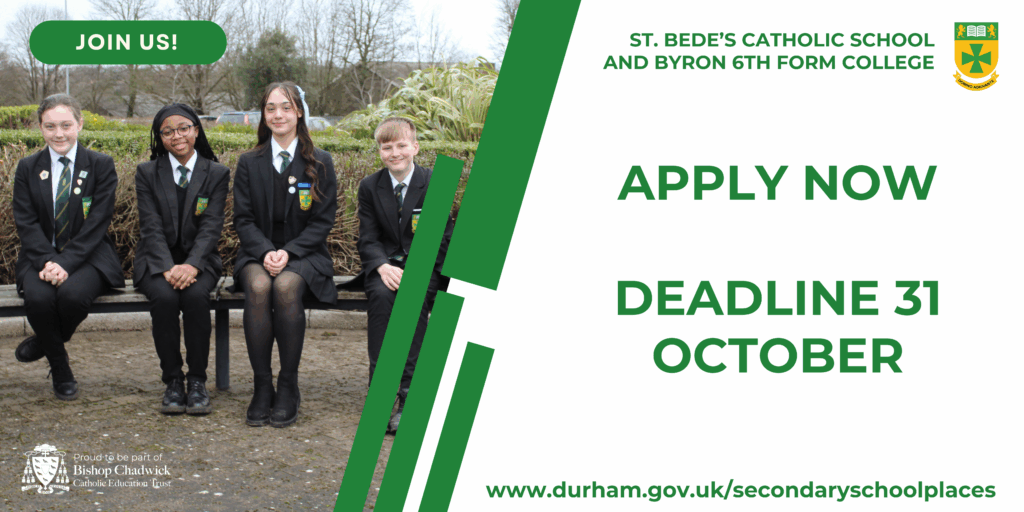In this section of the website, you will find information about the Intent, Implementation and Impact to teaching Mathematics at St Bede’s Catholic School. View our course information below:
The Maths curriculum has been developed with our curriculum intent woven throughout, as well as our understanding of St Bede's pupils, their context and their prior learning. In Key Stage 3 (Years 7 - 9), pupils explore the 4 key strands of mathematics in every year (Number & Ratio, Algebra, Geometry and Statistics) allowing their knowledge to be broadened and deepened in each iteration. Launching in September 2025, our Year 7 pupils shall experience their learning through a mastery approach, with the purpose of ensuring every pupil achieves their potential in maths with a deep and fluent understanding of the subject. In Key Stage 4 (Years 10 - 11), pupils commence their GCSE programme of study completing either the Foundation (Grades 1 - 5) or Higher (Grades 1 - 9) tiers of the OCR exam board. Again, pupils revisit and deepen their understanding of the 4 key strands of mathematics, applying them to more complex problems and contexts. The final assessment for their qualification takes place at the end of Year 11 through three 90 minute examinations, using a non-calculator paper. A portion of our Key Stage 4 pupils undertake a course in GCSE Further Mathematics, providing in conjunction with Royal Grammar School Newcastle. In Key Stage 5 (Years 12 - 13), pupils build greatly on their GCSE learning completing the Edexcel course for A Level Mathematics. As well as Pure Mathematics topics (including coordinate geometry, differentiation and trigonometry), pupils explore Applied Mathematics in more detail than ever before, visiting topics such as kinematics in Mechanics or normal distributions in Statistics. In addition to pupil's classroom learning, we have an exciting extra curriculum for pupils to enjoy with a sequence of clubs and activities to connect their math's learning to new contexts. As a Catholic school, the education of the whole person is equally important and we have a bespoke personal development strands interwoven within our taught curriculum, exploring careers, local context and key individuals in mathematics as well as protected characteristics and British Values. Key Stage 4 Assessment Objectives A01: Use and apply standard techniques. Students should be able to: A02: Reason, interpret and communicate mathematically. Students should be able to A03: Solve problems within mathematics and in other contexts. Students should be able to: Key Stage 5 Assessment Objectives Mathematical argument, language and proof: Mathematical problem solving: Mathematical modelling: The curriculum is sequenced coherently, allowing the interweaving of topics to support the acquisition of key concepts; it is compatible with the key requirements of the National Curriculum and robust collaboration between primary and secondary phases ensures progression. Curriculum components are repeated over time, ensuring all pupils practice retrieval, master skills and concepts, develop long term memory and make progress from starting points. Retrieval tasks are built into all lessons to enable pupils to remember more. The ‘Bigger Picture’ is shared with pupils, providing them with a rationale for their learning and to make links between lessons, allowing them to know more and remember more. Teachers ensure lessons provide a supportive environment for all pupils including those with SEND, removing barriers to learning and participation through adaptive planning, modelling, scaffolding, explicit instruction and metacognitive strategies. Accurate, regular assessment enables an informed and systematic judgement to be made about a pupil’s knowledge, understanding, skills and attitude. Pupils are provided with feedback and set ‘perfecting our work’ targets to close any learning gaps. Teachers provide a language-rich environment. Key tier 2 and tier 3 vocabulary is mapped out carefully across the curriculum to enable our pupils to learn the correct words and phrases in the right order. A phonics-led approach is used to improve reading and spelling. Carefully selected texts are used to foster a culture of scholarly reading. Pupils are given opportunities to consider how their learning links to future study and careers, and the importance of British Values. Within our very own personal development curriculum, pupils explore key individuals in the world of mathematics, using these individuals to explore key concepts such as protected characteristics as well as deepen their understanding of British Values. The curriculum is enriched to include experiences outside the classroom, such as Trust Maths Challenges – these are held annually for Key Stages 3, 4 and 5. Students compete with other schools in the Trust to display their knowledge of the subject. Students are provided with a range of recommended reading materials to support and extend their journey through the curriculum. These are designed to be accessible and informative for all students and provide an opportunity for students to investigate the wider context of their learning.
Progression Maps



